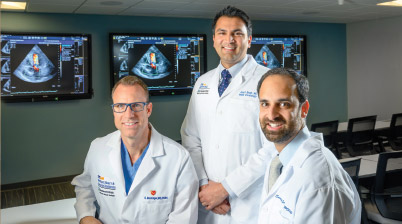
(l to r) Glenn Meininger, MD, Ankit Shah, MD, and Sandeep Jani, MD
About one in every 500 people in the U.S. are at risk for developing hypertrophic cardiomyopathy logy, Baltimore region, says, “Patients with significant risk of (HCM). As many as 1 percent of those are at risk for sudden death may benefit from placement of a defibrilla- ventricular arrhythmias that could lead to sudden death, making HCM the leading cause of cardiac death in young adults. That’s why the MedStar Heart & Vascular Institute (MHVI) has established a multidisciplinary HCM Clinic to diagnose patients at risk and follow them long-term.
Characterized by an abnormal thickening in the heart muscle, HCM can obstruct normal blood flow, causing shortness of breath, chest pain, dizziness and faint- ing. “HCM patients often require specialized care to keep them feeling as well as possible, understand and reduce their chance of sudden death, and appropriately screen and treat family members,” says Sandeep Jani, MD, a cardi- ologist who specializes in advanced heart failure and heart muscle disorders, and is HCM Clinic medical director.
The HCM team includes cardiac imaging experts, electrophysiologists, interventional cardiologists and cardiac surgeons. In addition, Ankit Shah, MD, one of the few fellowship-trained sports cardiologists in the nation, specializes in managing cardiac conditions in athletes. The team also includes a dedicated cardiogenetics specialist to determine genetic factors that may be involved.
“We offer world-class interdisciplinary care, partnering with referring cardiologists,” Dr. Jani explains. The clinic operates at MedStar Union Memorial Hospital in Baltimore. Patients in the D.C. area can contact Andrew Ertel, MD.
The first step is a thorough patient history and a physical exam. The clinic coordinates a full complement of testing modalities depending on the needs of each patient, including electrocardiogram, echocardiogram, genetics testing, cardiac imaging, stress testing, cardiopul- monary testing, EP testing, and cardiac catheterization.
“Then we analyze the results according to risk scores, taking into account heart muscle thickness, family history of sudden cardiac death, and genetics,” Dr. Jani says.
Glenn Meininger, MD, medical direction, Electrophysiology, Baltimore region, says, “Patients with significant risk of sudden death may benefit from placement of a defibrillator. Defibrillators are our best strategy for these patients.”
Other patients develop obstruction that may require specialized medications, catheter-based procedures or open heart surgery. “What’s important to know is that patients with HCM require ongoing screening,” Dr. Jani adds. “Things can change over the course of time.”
Dr. Shah provides an individualized approach to HCM as it relates to activity. “Traditionally, exercise recommendations for HCM patients have been restrictive,” he says. “Many patients deliberately reduced their habitual physical activity after diagnosis, putting them at risk for sequelae of a sedentary lifestyle: weight gain, hypertension, insulin resistance and increased morbidity and mortality.”
The solution is an individualized approach for each patient. “Recent literature suggests that structured exercise training can be safe and well tolerated so, with the under- standing that nothing is risk free, we use cardiopulmonary exercise testing to provide patients with tailored exercise recommendations,” Dr. Shah says.
Genetics also plays an important role in HCM. Monisha Kisling is MHVI’s dedicated cardiac genetics counselor and is available to address genetic factors with HCM patients. “HCM tracks in families, so if a patient has a family history of sudden cardiac death, it’s worthwhile to determine if there is a genetic component.”
“If we identify a genetic change, we can screen family members for HCM,” she says. “Genetic testing is indicated for first-degree relatives if a family member who dies suddenly is found to have a thickened heart on autopsy.”
Dr. Jani adds, “We are available to help physicians assess and manage HCM patients. We follow patients over time so we can intervene at the appropriate time to prevent sudden death or other complications.”
For Baltimore patients, call 410-554-6550.
For Washington, D.C., patients, call 202-877-7777.









